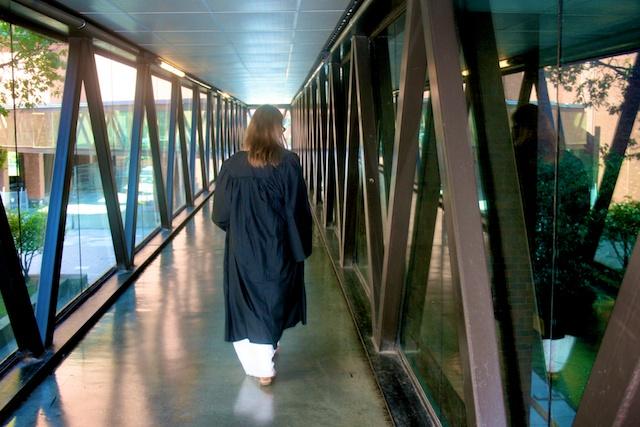“Getting a foot in the door” is a common refrain amongst people looking for a shot at a better opportunity. If you can just get somebody to give you a shot, you can work your way up. You’ll show everybody just how talented and useful you really are. The initial problem is just getting that first shot. This is especially the case for graduate school.
Many Massachusetts students aren’t sure if they will be able to get a four-year degree, let alone higher, so they start with a smaller one. According to Massachusetts Community Colleges, our 15 state community colleges account for nearly half of all students enrolled in public higher education. While many students don’t think beyond community college, many more want to continue. The Massachusetts Transfer Compact allows students who finish qualifying for two-year degrees and all other required coursework with at least a 2.0 GPA to transfer to an appropriate four-year degree program at the public institution of their choice. There are other restrictions, but many students at UMass Boston have used that compact to come here.
Students here work hard to get their bachelor’s degree, but, like at community colleges, some people want more. A master’s degree or a doctorate can have a tremendous impact on your job potential, although these advanced degrees are not for everyone. However, the process of applying for graduate schools can be a stressful one. Aside from finding schools, filling out long application forms and sending along all of your academic information — which, I can say from experience, gets more difficult if you’ve attended multiple colleges and universities — there are the exams.
A majority of prospective graduate students take the Graduate Record Exam (GRE), which is for graduate school what the SAT is for college. The test itself takes about five hours and costs $160. Seriously preparing for the test, even if you test well, generally takes a lot more time and money. It’s safe to say that two commodities public university students are low on are time and money. We’re more likely than private university students to have children, one or two jobs, or other family obligations. Cutting down the time, cost and stress of applying to graduate school would help more students apply. Also, the state has a vested interest in keeping as many college graduates in Massachusetts as possible. Students who go to public universities are more likely to do so than those who attend private ones.
I am calling for the creation of a new transfer compact for public universities — a Massachusetts Graduate Transfer Compact, if you will. The idea is simple: with similar general limitations as the other compact, including basic general education requirements, GPA in good standing, and some leeway for particularly popular graduate programs, a student finishing a four year degree at a Massachusetts public university would be exempted from the requirement to take the necessary graduate exam if they are applying for an appropriate degree program at graduate level. This might not be appropriate for all post-bachelor degrees, but it should apply to most of them.
This measure will make public universities across the state more attractive to potential incoming students. For those students who already know what they want, it would provide a less stressful journey to graduate school. Students unsure of what they want initially would have the freedom to try different programs and know that if they want to keep studying beyond a bachelor’s, they’ll have more choices to do so. And the various state universities will be able to focus more on GPA and personal factors than on a standardized test.
I took the GRE last semester while juggling four thought-provoking classes, numerous family obligations and multiple on-campus obligations. I managed the test, but dealing with it made a tough semester even tougher. We come to UMass Boston because it is offers quality higher education, provided at a good price, available at times that usually work with busy schedules. Extra burdens mean extra stress.
It takes hard work to get a bachelor’s degree. This compact would make it easier for students who dream of going further and are willing to work hard to achieve that dream.





















































